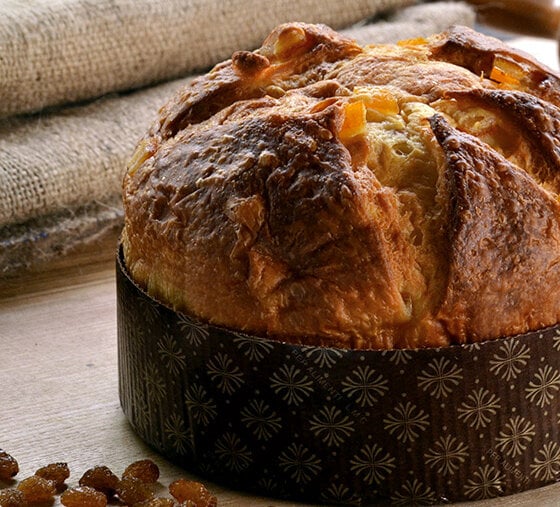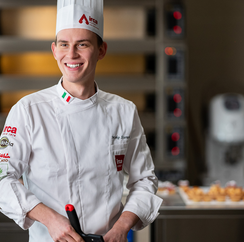PANETTONE PLATINUM EASY ( DOLCE FORNO)
Compared to the original Platinum recipe, the Platinum Easy recipe is easier to make while maintaining excellent taste and quality.

Compared to the original Platinum recipe, the Platinum Easy recipe is easier to make while maintaining excellent taste and quality.


Ingredients
| DOLCE FORNO | g 6500 |
| water - room temperature | g 2400 |
| caster sugar | g 500 |
| egg yolk | g 1600 |
| unsalted butter 82% fat - soft | g 2000 |
| yeast | g 30 |
Preparation
-Start the dough with the DOLCE FORNO MAESTRO, the yeast, all the water provided in the recipe and knead for at least 10 minutes.
-When the dough begins to form, add the sugar and a part of the egg yolk, then add the remaining yolk in several stages until you obtain a smooth structure.
-Finish with the soft butter which will be added in 3-4 times.
-Check that the temperature of the dough is 26-28°C.
- Leave to rise at 22-24°C for 12-14 hours with humidity of 70-80% or if you do not have a humidifier, cover the tub with a plastic sheet.
-The dough will have to quadruple its volume.
Ingredients
| DOLCE FORNO | g 3500 |
| egg yolk - room temperature | g 1250 |
| unsalted butter 82% fat - soft | g 1700 |
| caster sugar | g 700 |
| water - room temperature | g 800 |
| honey | g 350 |
| salt | g 110 |
| raisins | g 3000 |
| candied orange peel cubes | g 2500 |
Preparation
-The following morning the dough should be quadrupled and slightly rounded.
-Add the required quantities of DOLCE FORNO MAESTRO, water to the evening dough and knead for 5-10 minutes.
-Once the ingredients have been absorbed, add the sugar, salt, a part of the egg yolk and continue kneading.
-Then add the remaining egg yolk twice.
-Separately create the mixture of soft butter, honey, orange paste and vanilla and incorporate it into the paste 4 times.
-Check that the temperature of the dough is 26-28°C. If the temperature is lower, it is advisable to slightly heat the candied fruit and sultanas on a baking tray by placing them in the oven for 1-2 minutes.
-Gently incorporate the sultanas and candied fruit.
-Place the dough to proof in the leavening cell at 28-30°C for 60-70 minutes.
- Divide the dough into the desired sizes, then roll up and place on baking trays or boards and leave to rest for another 20 minutes at 28-30°C.
-Roll up again and place in the appropriate paper moulds.
-Place in a leavening cell at 28-30°C with relative humidity of approximately 60-70% for 4-5 hours, until the top of the dough reaches approximately 1 cm from the mould; if the cell does not have a humidifier, keep the panettone covered with plastic sheets.
-After leavening, leave the panettone exposed to the ambient air for 20-25 minutes so that a skin forms on the surface.
-With a sharp knife, make two superficial incisions forming a cross (the cuts to be made on the surface of the panettone must not be too deep and are necessary to give the finished product its characteristic and traditional shape).
-Cut the four edges under the skin and insert a small knob of cold butter in the center of the panettone.
-Cook at 165-185°C for variable times depending on the weight (about 35-40 minutes for 500 gram panettone, 50-60 minutes for 1000 gram panettone), until reaching 92-94°C at the core.
-Upon exiting the oven, turn the panettone upside down, using the appropriate panettone turners.
- Freshly baked panettone must be left to cool upside down for 8-10 hours before packaging in moplefan bags.

Pastry Chef